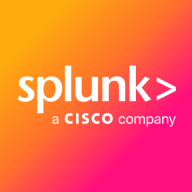

Splunk Enterprise Security and Sentinel are prominent players in the cybersecurity industry, particularly in data integration and security information event management (SIEM). Splunk holds a slight advantage with its comprehensive data ingestion and flexibility, while Sentinel excels in ease of integration and automation within Microsoft ecosystems.
Features: Splunk Enterprise Security offers advanced log management, rapid search capabilities, operational intelligence, and compliance features. Its schema-on-read technology and SPL language provide significant data flexibility. In contrast, Sentinel integrates strongly with Microsoft products and provides robust cloud-native features, automation, and cost-effectiveness.
Room for Improvement: Splunk Enterprise Security users seek enhancements in workflows, use case frameworks, and better integration with ticketing systems. There's also a demand for simpler setup processes and improved stability. Sentinel users urge improvement in vendor-specific device integrations and enhancements for cloud systems connectivity beyond major providers.
Ease of Deployment and Customer Service: Splunk Enterprise Security can be deployed across Public, Private, and Hybrid Clouds but faces varied feedback on technical support response times. Sentinel boasts efficient support for hybrid and multi-cloud environments, particularly Microsoft systems, yet could be more accessible globally by providing support in various languages.
Pricing and ROI: Splunk Enterprise Security's pricing is considered expensive, closely tied to data ingestion volumes, which can be challenging for smaller budgets but justified by extensive feature sets in large enterprises. Sentinel offers competitive pricing within Azure, favoring subscription-based models for scalable cost-efficiency.
The documentation for Splunk Enterprise Security is outstanding. It is well-organized and easy to access.
We couldn't calculate what would have been the cost if they had actually gotten compromised; however, they were in the process, so every investment was returned immediately.
On average, my SecOps team takes probably at least a quarter of the time, if not more, to remediate security incidents with Splunk Enterprise Security compared to our previous solution.
We have paid for Splunk support, and we’re not on the free tier hoping for assistance; we are a significant customer and invest a lot in this service.
I have had nothing but good experiences with Splunk support, receiving timely and helpful replies.
We've had great customer success managers who have helped us navigate scaling from 600 gigs to 30 terabytes.
We currently rely on disaster recovery and backup recovery, which takes time to recover, during which you're basically blind, so I'm pushing my leadership team to switch over to a clustering environment for constant availability.
It is one of the things that separates it from other tooling, and if not, it is the most scalable solution out there.
They struggle a bit with pure virtual environments, but in terms of how much they can handle, it is pretty good.
They test it very thoroughly before release, and our customers have Splunk running for months without issues.
Splunk has been very reliable and very consistent.
We need more SMEs, and there is no mechanism to tell us about indexer or search head issues.
Price is always a consideration, so the price would be nice if it were lower.
Improving the infrastructure behind Splunk Enterprise Security is vital—enhanced cores, CPUs, and memory should be prioritized to support better processing power.
Splunk Enterprise Security is not something that automatically picks things; you have to set up use cases, update data models, and link the right use cases to the right data models for those detections to happen.
For any future enhancements or features, such as MLTK and SOAR platform integration, we need more visibility, training, and certification for the skilled professionals who are working.
They nearly always bill it in dollars, so if it can be billed in our currency, that would be helpful and fixed in our currency.
I saw clients spend two million dollars a year just feeding data into the Splunk solution.
The platform requires significant financial investment and resources, making it expensive despite its comprehensive features.
I find it to be affordable, which is why every industry uses it.
Sentinel's best features include that it's a very easy product to use.
This capability is useful for performance monitoring and issue identification.
I assess Splunk Enterprise Security's insider threat detection capabilities for helping to find unknown threats and anomalous user behavior as great.
Splunk Enterprise Security provides the foundation for unified threat detection, investigation, and response, enabling fast identification of critical issues.
| Product | Market Share (%) |
|---|---|
| Splunk Enterprise Security | 7.1% |
| Sentinel | 3.1% |
| Other | 89.8% |

| Company Size | Count |
|---|---|
| Small Business | 9 |
| Midsize Enterprise | 3 |
| Large Enterprise | 7 |
| Company Size | Count |
|---|---|
| Small Business | 110 |
| Midsize Enterprise | 50 |
| Large Enterprise | 264 |
Sentinel is a full-featured Security Information and Event Management (SIEM) solution that simplifies the deployment, management and day-to-day use of SIEM, readily adapts to dynamic enterprise environments and delivers the true "actionable intelligence" security professionals need to quickly understand their threat posture and prioritize response.
Splunk Enterprise Security delivers powerful log management, rapid searches, and intuitive dashboards, enhancing real-time analytics and security measures. Its advanced machine learning and wide system compatibility streamline threat detection and incident response across diverse IT environments.
Splunk Enterprise Security stands out in security operations with robust features like comprehensive threat intelligence and seamless data integration. Its real-time analytics and customizable queries enable proactive threat analysis and efficient incident response. Integration with multiple third-party feeds allows detailed threat correlation and streamlined data visualization. Users find the intuitive UI and broad compatibility support efficient threat detection while reducing false positives. Despite its strengths, areas such as visualization capabilities and integration processes with cloud environments need enhancement. Users face a high learning curve, and improvements in automation, AI, documentation, and training are desired to maximize its potential.
What Are the Key Features of Splunk Enterprise Security?In specific industries like finance and healthcare, Splunk Enterprise Security is instrumental for log aggregation, SIEM functionalities, and compliance monitoring. Companies leverage its capabilities for proactive threat analysis and response, ensuring comprehensive security monitoring and integration with various tools for heightened operational intelligence.
We monitor all Security Information and Event Management (SIEM) reviews to prevent fraudulent reviews and keep review quality high. We do not post reviews by company employees or direct competitors. We validate each review for authenticity via cross-reference with LinkedIn, and personal follow-up with the reviewer when necessary.